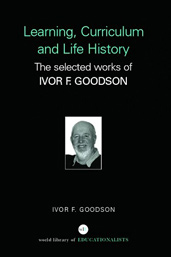Learning, Curriculum and Life Politics: the selected works of Ivor F. Goodson
Towards an Alternative Pedagogy
Current classroom practice is largely derived from the belief that the teacher's basic task is the 'transmission of knowledge'. At one level this statement is obviously true - any pedagogy is concerned with the transmission of values and ways of knowing - but at the level of rhetoric 'transmission' has come to characterize a particular view of practice and an associated view of knowledge as a commodity. The distinction between transmission as an aspect of pedagogy and transmission as pedagogy is in this sense crucial. What may seem a superficial confusion in educationists' language might mark a deeper confusion of considerable importance. Implicit in the notion of transmission is a one-way communication; it is to 'pass on, hand on'(Concise Oxford Dictionary) knowledge from the teacher to the pupil. In this paper I take 'transmission' as characterizing any educational incident which sets the learning of knowledge previously planned or defined by the teacher as the basic objective. In thus characterizing transmission I am echoing practice derived from this model in that curricula and lessons centre on the prior definition of knowledge for transmission. The transmission pedagogue works to defend this prior definition against interactive redefinition.
By this definition a broad spectrum of teaching styles - 'chalk and talk', 'question and answer', 'discovery projects', 'discussion', 'individualized worksheets' - might be seen as following the transmission model. Hence in 'chalk and talk' the teacher will have decided beforehand what content, concepts or skills he wants to get across: in the 'question and answer' he will have decided what answers are the right ones that he is after: in 'discovery' he will know what he is aiming to help the child discover. In all cases the style of the encounter and the outcome are previously prescribed.
This paper will argue that if the intention of teaching is to involve all pupils in learning then transmission, with its dependence on the viability of pre-planned educational incidents and outcomes, is particularly ill suited. In arguing this way I am not wishing to imply that pupil/teacher interaction should go on without using previously defined ideas, material and conceptual structures, or that at no stage should ideas and content be transmitted from teacher to pupil. I am, however, arguing that it is misguided to set transmission as the basic role of the classroom teacher.
The substantial forces maintaining transmission as the dominant pedagogy only partly explain why the development of radical alternatives has largely gone in default. In spite of the enormous validity of its critique of transmission teaching, child-centred progressivism remains for most a negative creed: sure that to transmit to an unwilling child is pointless, but unsure what to do instead. As a result, the 'failure' of the transmission classroom often becomes the 'problem' of the progressive teacher. By only reacting negatively to transmission pedagogy, progressivism is in danger of becoming an extension of it.
It is time to move on from the negativity of progressivism to the definition of a positive alternative pedagogy. To do so might transform educational debate from the present 'no contest' between ideologies which both faithfully reproduce the social system into a dialectic concerned with educational priorities. Much is to be gained by teachers exploring the possibilities of changing their classroom practice, but to do so they need to move beyond the potent but frustrated plea: 'OK, but what's the alternative?' This article pursues a tentative search for an answer.
